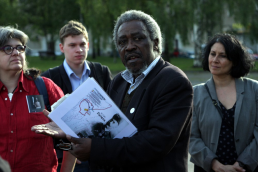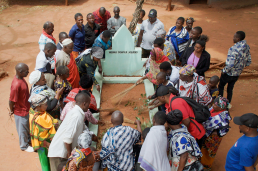Witness Walks
The Witness Walks project aims to provide a special kind of “Heimatkunde”. With close reference to the heimaten Festival of the House of World Cultures in September 2025, it brings interested Berliners, visitors to Berlin and young people from Hamburg closer to the colonial-racist but also anti-racist history of the capital. It not only highlights Berlin’s centuries-long involvement in global contexts. Witness Walks enables a discussion about questions of memory culture and demands for restorative justice in the post-colonial present.
Free city tours to specific places of learning and remembrance in Berlin by activist Mnyaka Sururu Mboro and the presentation of the Tanzanian-German documentary film “The Empty Grave” (2024) – also with free admission – make it possible to experience the extent to which our homes are connected – and at the same time separated from one another.

The heimaten network is an initiative of Haus der Kulturen der Welt as part of heimaten, funded by the
Federal Government Commissioner for Culture and the Media on the basis of a decision by the German Bundestag.
Witness Walks – Anti-colonial City Tours
11.09.2025 (Stadtmitte)
27.09.2025 (Afrikanisches Viertel)
11.10.2025 (Stadtmitte)
25.10.2025 (Afrikanisches Viertel)
13:00 – 15:30 h
Meeting Points
U-Bhf. Anton-Wilhelm-Amo-Straße, Exit Wilhelmstraße (Stadtmitte)
U-Bhf. Afrikanische Straße, Exit Swakopmunder Straße (Afrikanisches Viertel)
01.11.2025 (Afrikanisches Viertel)
08.11.2025 (Stadtmitte)
22.11.2025 (Afrikanisches Viertel)
06.12.2025 (Stadtmitte)
Admission: Free
Language: GER
Info
Groups (GER/EN) may book individual tours:
buero(at)berlin-postkolonial.de.

The memory of the crimes of National Socialism is marked by the passing of the last contemporary witnesses: Fewer and fewer survivors are able to report directly on the horrors of dictatorship, war of conquest and extermination.
It is still more possible to remember with the contemporary witnesses of European colonialism in Africa. But even those who could tell us about British, French and Belgian colonialism from their own experience are now elderly.
One of these rare contemporary witnesses is the teacher and activist Mnyaka Sururu Mboro from Tanzania, who lives in Berlin. He personally experienced British rule over Tanganyika. Mboro can also talk about the previous colonial rule by the Germans, who had his ancestor executed after a resistance action.
Since 2005, Mnyaka Sururu Mboro has been guiding interested people of all ages through the historic center of Berlin and the African Quarter in Wedding. In doing so, he familiarizes Berliners better with their post-colonial city, which he has actively helped to shape: the renaming of colonial streets in Berlin to honor African/Afro-diasporic resistance is due in no small part to his persistent commitment.
With: Mnyaka Sururu Mboro
Special Thanks: Stiftung Stadtmuseum Berlin
More on the HKW website ≫
Witness Walks – Documentary Film
Das leere Grab | The Empty Grave
Tanzania/Germany, 2024
Documentary with Discussion
Sun.,14.9.2025, 17:30 h
Place: Haus der Kulturen der Welt
(Safi Faye Saal)
John-Foster-Dulles-Allee 10, 10557 Berlin
Languages: Kiswahili, German, English
(partly with German subtitles);
Discussion: English
Entrance: free
Directors: Agnes Lisa Wegner, Cece Mlay
Camera: Markus Winterbauer
Cut: Donni Schoenemond
Music: Hannah von Hübbenet
Audio: Oliver Stahn
Producers: Christoph Holthof, Daniel Reich, Amil Shivji & Luna Selle
Editor: Sara Günter (ZDF)
Production: kurhaus Production und Kijiweni Productions in Koproduction with ZDF – Das kleine Fernsehspiel
Distribution: Salzgeber

Tens of thousands of human remains from former colonies are still stored in German museums. It is still unclear how they can be identified and traced back. ‘The Empty Grave’ follows two families in search of their ancestors: In southern Tanzania, lawyer John Mbano and his wife Cesilia follow in the footsteps of his great-grandfather, who was executed by the German colonial army in 1906. His ancestor’s head was taken to Germany for racist ‘research purposes’; the family is still haunted by this pain today. Felix and Ernest Kaaya are in a similar situation: in northern Tanzania, they are fighting for the return of their ancestor’s remains and are travelling to the metropolis of Dar es Salaam to do so.
The families wrestle with the thicket of bureaucracy, but also receive support from activists such as Mnyaka Sururu Mboro and Konradin Kunze, who are raising the profile of the issue in Germany. With their help, the Mbanos are received at the Federal Foreign Office, and then even Federal President Steinmeier comes to their home town to apologise for the suffering inflicted. However, the grave is still empty.
In their film, the German-Tanzanian directing duo Agnes Lisa Wegner and Cece Mlay tell of the trauma that German colonial rule has left behind in Tanzanian communities to this day – and of the strength and self-empowerment of the bereaved, who are stubbornly campaigning for a full investigation.
Discussion with: Felix Kaaya, Konradin Kunze, Mnyaka Sururu Mboro, Cece Mlay, Agnes Lisa Wegner
Thanks: Leipziger Missionswerk
More on the HKW website ≫
